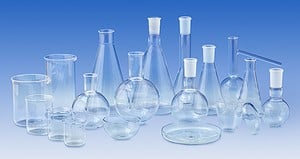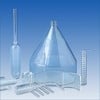Flasks, Beakers, Dishes, Test Tubes, & more…
Featured Product from Technical Glass Products, Inc. - OH

Technical Glass Products' Clear Fused Quartz labware is manufactured to the most stringent quality standards, enabling it to withstand extreme temperature fluctuations of up to 1250°C.
- BOILING FLASKS
- BOILING FLASK W/JOINT
- ERLENMEYER FLASKS
- ERLENMEYER W/JOINT
- DISTILLING FLASKS
- KJELDAHL FLASKS
- GRADED SEALS • QUARTZ TO PYREX
- STOPCOCKS
- LOW FORM BEAKERS
- TALL FORM BEAKERS
- CRUCIBLES WITH LIDS
- TEST TUBES
- ROUND DISHES
- EVAPORATING DISHES
ABOUT TECHNICAL GLASS PRODUCTS
Since its establishment in 1990, Technical Glass Products, Inc. has been a leading manufacturer of Fused Quartz Glassware known for its commitment to excellence. TGP has grown to become the fastest-growing supplier of stock shapes and fabricated products in the industry.
With two manufacturing facilities, TGP maintains a wide inventory of labware, flat stock, rod, and tubing. The company employs top engineers, machinists, and glass blowers, enabling us to meet the diverse requirements of our customers.
We offer technical product assistance, including design, temperature ranges, and purity level qualifications. Our state-of-the-art equipment and methods allow us to meet the industry's most stringent standards and tolerances. Our products come with a guarantee of workmanship and quality.
TGP prides itself on its expertise and welcomes the opportunity to serve all your quartz needs.
Ordering online is easier than ever.
Silica is ubiquitous in nature and constitutes nearly one-third of the Earth's crust. The term Vitreous Silica encompasses all forms of silica glass, which manufacturers typically classify as either Fused Quartz or Fused Silica.
Fused Quartz is made by melting naturally occurring crystalline silica, such as rock crystal or sand, using either electric or flame fusion. The resulting products can range from transparent to translucent or opaque, allowing for a wide range of applications.
Synthetic fused quartz, or Fused Silica, is made using high-purity silica sand that is manufactured from SiCL4. The final product is transparent in appearance.
Vitreous Silica, in all its forms, exhibits a range of properties, including:
- Permeability
- Extreme Hardness
- Very Low Coefficient of Thermal Expansion
- Resistance to High Temperature
- High Chemical Purity
- High Corrosion Resistance
- Extensive Optical Transmission from Ultra-Violet to Infra-Red
- Excellent Electrical Insulation Qualities
- Remarkable Stability Under Atomic Bombardment
Internal Pressure Calculations
Knowing the maximum pressure that a selected fused quartz tube can withstand is essential in applications where internal pressures are involved. The formula provided below can provide an approximation of this information at room temperature. In addition, there are helpful calculator applications available here.
Cleaning
It is crucial to clean fused quartz thoroughly before using it in any application. The recommended cleaning method is immersing it in a solution of Ammonium Bifluoride with a maximum concentration of 7% for no more than ten (10) minutes, or a solution of Hydrofluoric Acid with a maximum volume concentration of 10% for no more than five (5) minutes. Once cleaned, the fused quartz should be rinsed with either deionized or distilled water and then dried.
It is important to handle fused quartz with care to avoid contamination. Using clean cotton gloves at all times is essential in reducing the possibility of contamination.
Running In Procedure
To enhance the durability of quartzware against devitrification and sagging, it is necessary to create a uniform coating of cristobalite on the outer diameter of quartz tubes. This can be achieved by subjecting a new tube to a temperature of up to 1200°C and rotating it by 90 degrees every two (2) hours for the initial 12 to 24 hours.
Storage
If there is enough space, it is advisable to store fused quartz in its original shipping container. If this is not possible, it is recommended to retain the wrapping. For tubing, it is important to keep the end coverings in place until the product is ready to be used. This helps to prevent chipping of the ends and keeps dirt and moisture out, which could affect the purity and performance of the tubing.
Because The Products Are Annealed
Quartz and silica glass are both annealed at around 1150°C, and they reach a strain point of about 1120°C. If these glass products are rapidly cooled after being used at temperatures above this strain point, they may develop strain once again. Therefore, extra caution is required when using larger sized products.
When Joining Fused Quartz And Other Materials
When connecting quartz or silica glass products with other materials, it is important to note that these glass materials exhibit only slight expansion with temperature increases, in contrast to other materials. Therefore, special care must be taken to prevent the development of cracks when the temperature rises.
Care Must Be Taken During Furnace Insertion
Quartz and silica glass have low thermal conductivity, which makes them susceptible to cracking if they come into close proximity with a heating element or are in direct contact with a flame. This can cause local overheating. In addition, long glass tubes may deform at temperatures exceeding 1100°C. It is important to support both glass types, particularly large-sized products, to avoid damage.
Devitrification
Devitrification is the transition of quartz and silica glass from a metastable or vitrified state to a stable crystallized state of cristobalite. It can happen when the glass product is used at high temperatures over a long period or heated while impurities are present on the surface. Even small impurities on the surface can greatly influence devitrification. If the glass surface is perfectly clean, devitrification is unlikely to occur at temperatures of 1150°C or less, but it may occur at temperatures of 1000°C or less under the mentioned conditions. Typically, devitrification begins at temperatures of 1200°C or higher and progresses as the temperature increases. Careful cleaning and handling can help prevent devitrification.
Special Handling And Precautions
To prevent devitrification, it is important to handle glass products carefully and avoid direct contact with bare hands. Always wear clean, lint-free gloves or powder-free latex gloves when handling glass. This is because the skin naturally contains salts with alkali metal elements, such as sodium and potassium, which can accelerate devitrification.
MOMENTIVE® CALCULATORS & REFERENCE TOOLS
Technical Glass Products is an authorized fabricator of Momentive Fused Quartz, which is known for its exceptional high-temperature properties and unparalleled purity. With Momentive quality, Technical Glass Products can provide reliable and cost-effective glassware fabrication services, supported by a team of material and fusion experts.
Technical Glass Products is dedicated to providing custom fabrication services for fused quartz products according to your specific requirements. Our team of skilled craftsmen has extensive experience in producing high-quality fused quartz apparatus, from small-diameter components to large furnace tubes and bell jars, to meet and exceed your expectations for excellence.
We also offer a wide range of standard fused quartz products that are readily available for immediate shipment to fulfill your glassblowing needs. Our commitment to quality, exceptional customer service, and competitive pricing has made us a trusted name in the global fused quartz fabrication industry.
As an authorized distributor and fabricator for several leading quartz raw material suppliers, including Momentive, we are proud to be recognized as a world leader in the industry. These products include:
- Momentive Performance Materials (formerly GE Quartz)
- Philips
- Heraeus
- Qsil
At TGP, we strive to not only meet, but exceed your expectations when it comes to quality, service, and pricing. Our ultimate goal is to become your preferred choice as a quartz fabricator and distributor for your company.
For prompt evaluation and quotation of your project, please contact us: CONTACT US










